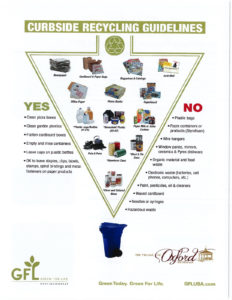
Pay more for recycling services or the waste at the curb will be shipped to either an incinerator or a landfill. That was the choice presented to the Oxford Village Council last week.
Officials selected the former option and voted 5-0 to have the village’s approximately 1,100 households begin paying an additional $1.12 per month.
“I think we have to recycle,” said Councilwoman Maureen Helmuth. “I think we have to do this.”
Village residents currently pay $10.92 per month for Green For Life (GFL) Environmental USA, Inc. to collect their trash and recyclable materials every week. Beginning in May, the extra $1.12 will appear on the monthly utility bill residents receive from the village.
The additional amount is meant to help GFL offset the increased processing fees it claims it’s being charged by material recovery facilities (MRFs) where the contents of recycling carts and bins are sent.
The reason MRFs are charging more is twofold, according to a Feb. 18 letter from Lou Berardicurti, regional vice president for GFL Environmental USA.
Part of the issue is China. The nation used to be the primary destination, or end market, for most recyclable materials. But, it has stopped buying them because of politics and the increasing levels of contamination in the loads it was receiving.
Recycling loads get contaminated by items such as dirty pizza boxes and plastic bags, which can get stuck in sorting machines.
Due to “the escalating trade actions taken by the USA against China,” the Asian nation “adopted a contamination limit (0.5 percent) that effectively prohibits the import of most of the types of plastics and mixed paper that have historically been shipped there,” Berardicurti wrote. “China has made it clear that they do not intend to reverse these policies any time in the near term.”
Berardicurti noted “alternate markets” like Vietnam, Indonesia, Malaysia and Thailand “do not have the capacity to accept the volume or types of materials that were previously shipped to China.”
China aside, the other part of the problem is the MRFs in southeast Michigan. According to Berardicurti, these facilities do “not have sufficient capacity to process the increasing quantity of material that is being diverted from (trash) collection to the recycling stream or to deal with the increasingly high levels of contamination.”
“High contamination rates mean that materials that might otherwise be considered recyclable are not in fact capable of being recycled and therefore end up being sent by the MRF for disposal in a landfill,” Berardicurti wrote.
MRFs are trying to produce recyclables that can be “sold to an end market” by hiring more employees and “running their sorting equipment at a much slower rate,” so they can separate “contaminated and non-recyclable materials” from those items that can be processed, he explained.
“MRFs have passed on their resulting higher operating costs to collectors like GFL, resulting in an over 60 (percent) increase in processing fees, as well as the rejection and/or landfilling of a significant volume of materials that are collected and delivered to these MRFs,” Berardicurti wrote.
In response to all this, GFL presented the village with two options:
- Pay an additional $1.12 per month per household to continue having residents’ recyclable waste sent to MRFs for processing.
- Continue paying the same rate and all of the materials placed at the curb, be they in trash cans or recycling carts/bins, will be sent to either a landfill or Detroit Renewable Power’s solid waste incinerator.
“The incinerator, which uses waste to generate both steam heating/cooling and electrical energy, offers a green disposal alternative to landfills,” Berardicurti wrote.
“They’re not requiring us to pay any more,” said village Manager Joseph Madore while addressing council. “They will (continue to) handle our trash at the contract rate. They’re giving us this option (to pay more to maintain recycling).”
Village President Joe Frost doesn’t view incinerators as a “green” option.
“I am a firm believer in science,” he said. “I’m a firm believer that the decisions that we have made are affecting our climate and burning plastics is one of those (decisions).”
Helmuth agreed.
“We’re not recycling if we’re sending it to an incinerator,” she said.
Helmuth expressed her opinion that if GFL doesn’t continue taking the village’s recyclables to MRFs, it would constitute “a breach of contract.”
But, Madore pointed out that turning “waste to energy” via an incinerator is considered a form of recycling.
Councilwoman Kate Logan asked if the recyclable waste currently being placed at the curb is going to MRFs.
“I’m told that no changes have been made yet,” Madore replied.
Council members ultimately agreed they want recycling services to continue, but they also believe residents need to be better informed as to which materials can and cannot be placed in their curbside carts and bins.
“I think it’s very important that we reeducate our community,” Helmuth said.
“I want to make sure that we’re using the service properly . . . so that it has the best effect that it can on us and our world,” Logan said.

Leave a Reply